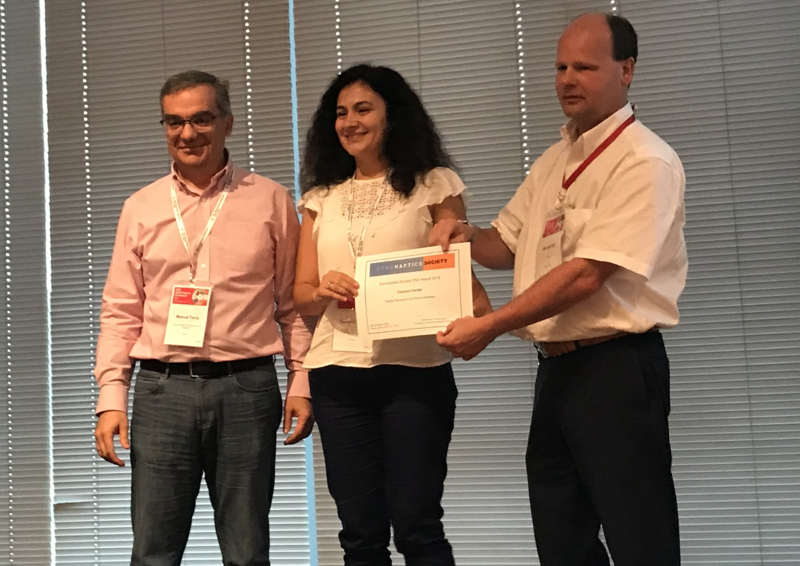Yasemin Vardar wins the 2018 EuroHaptics Society Best Ph.D. Thesis Award
- 12 July 2019
- Stuttgart
- Haptic Intelligence
She received the prize at the IEEE World Haptics Conference in Tokyo, Japan, on July 12, 2019
Tokyo – Dr. Yasemin Vardar, a postdoctoral researcher at the Max Planck Institute for Intelligent Systems (MPI-IS) in Stuttgart, is the winner of the 2018 EuroHaptics Society award for the best Ph.D. thesis in the field of haptics. She received the prize at the IEEE World Haptics Conference in Tokyo, Japan on July 12, 2019. In addition to receiving an honorarium of 1000 Euros, Ms. Vardar was given the opportunity to present an overview of her thesis in a special plenary session, and publishing house Springer has invited her to publish her dissertation as a monograph.

While Ms. Vardar is currently a member of the Haptic Intelligence Department at the MPI-IS, the award honors research she conducted at Koc University in Turkey, where she completed her doctorate in Mechanical Engineering under the supervision of Professor Cagatay Basdogan (Koc University) and Professor Burak Güçlü (Bogaziçi University, Turkey).
The best thesis award is a highly competitive scientific prize that goes to only one person per year. Seven theses were nominated in this round. A team of reviewers read each of the nominated dissertations and selected the winning thesis based on its scientific quality and expected impact on the field. “I am extremely happy to receive this award!”, says Vardar. Her postdoctoral advisor at the MPI-IS, Dr. Katherine J. Kuchenbecker, is similarly enthused, saying “Yasemin’s doctoral research greatly improved our understanding of surface haptics, which is currently the hottest topic in our field. She has taught me a great deal, and I’m delighted her outstanding doctoral research has been recognized in this way.”
Titled “Tactile Perception by Electrovibration”, Dr. Vardar’s Ph.D. thesis centers on investigating human haptic perception of friction on electrostatically actuated touch screens. Electrostatic actuation enables researchers to create various haptic sensations by modulating frictional forces between the human finger and the screen. These touchscreens are expected to be used in mobile phones, tablets, kiosks, and information displays in the future. “This technology has exciting potential applications in online shopping, gaming, education, data visualization, and developing user interfaces for the blind,” Vardar is certain. “In my thesis, I investigated both perceptual and physical mechanisms responsible for haptic effects created on touchscreens using this technique.”
At the MPI-IS, which she joined as a postdoctoral researcher in February 2018, Dr. Vardar is currently working on two projects. First, she is investigating more precisely how the electrostatic effect generates tactile sensations on touchscreens. This complex phenomenon involves electrical, mechanical, and perceptual factors and is thus particularly challenging to understand. Second, she is working to characterize human perception of real surfaces through both vision and touch. For example, why does one kind of fabric feel rough to the skin, and another smooth? Dr. Vardar hopes to combine her findings in these two domains to invent a method for realistically emulating the feel of everyday surfaces on touchscreens. “For example, in the future, using this technology we may be able to feel the texture of fabric or wood on our smartphones,” she explains.
Dr. Yasemin Vardar earned her Ph.D. in Mechanical Engineering from Koç University (Istanbul, Turkey) in 2018. Before her Ph.D., she worked as a control engineer at TNO Additive Manufacturing Department in Eindhoven, the Netherlands. She received her M.Sc. degree in Systems and Control at the Eindhoven University of Technology in 2012, and her B.Sc. degree in Mechatronics Engineering from Sabanci University (Istanbul, Turkey) in 2010. Her research focuses on understanding how human tactile perception occurs and designing haptic interfaces and applications using this knowledge.
Interestingly, the 2017 EuroHaptics Society Best Ph.D. Thesis Prize was won by Dr. Hasti Seifi, another postdoctoral researcher presently working in the Haptic Intelligence Department at the MPI for Intelligent Systems. Dr. Seifi served on the selection committee for the 2018 prize but was not involved in the review of Dr. Vardar’s thesis.
The EuroHaptics Society’s aim is to contribute to and promote the advancement of haptics all over the world, but with a focus on Europe. Find out more here: https://eurohaptics.org/
Yasemin Vardar
Mechanical Engineering
Tactile Perception
Haptic Intelligence



